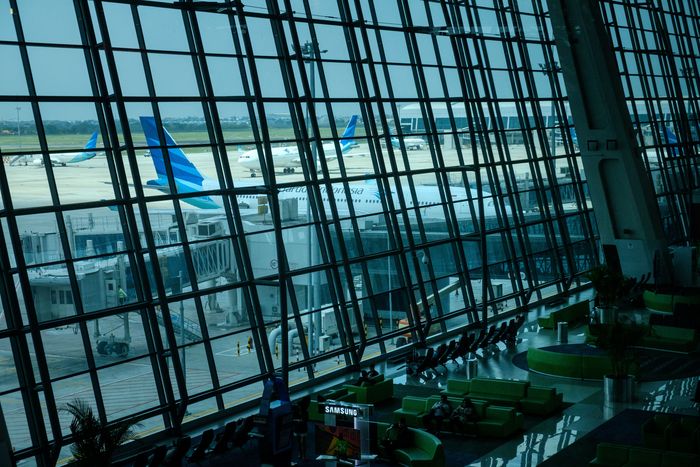Aviation is one of the fastest growing sources of GHG emissions and the most climate-intensive mode of transport. Globally, aviation emissions have more than doubled in the last 20 years and, when including the significant non-CO2 climate effects of aircraft flying at altitude, the sector is responsible for an estimated 4.9 % of man-made warming.
Aviation emissions in Europe having doubled since 1990 while globally they could, without action, double or treble by 2050. Such emissions growth needs to be reversed and brought to zero by 2050 if we are to meet the goals of the Paris Agreement. Otherwise growth in aviation emissions could rapidly consume the limited carbon budget to remain within the 1.5 and 2°C targets of that Agreement.
Urgent calls to addressing aviation's climate impact
The need for Europe to do more to address aviation’s climate impact has never been accorded a higher political priority – whether by the incoming Commission President Ursula von der Leyen or her rivals during the EU elections who explicitly called for the taxation of jet fuel, or by voters themselves who generated a clear green wave targeting aviation emissions. June 2019 saw unprecedented calls from European Finance Ministers, the OECD, World Bank and International Monetary Fund to fairly tax aviation at a special conference hosted by the Dutch Finance Ministry in the Hague. And of course the rising public clamour for action on aviation is set to grow and start to heavily impact the thinking of politicians and regulators.
It has been clearly established that the agenda for tackling aviation emissions includes such options as taxing kerosene – starting within Europe; strengthening and expanding ticket taxes across Europe which make up for billions lost through the exemption for VAT on air tickets. Only six EU countries currently have such taxes. A recent study for the European Commission into aviation taxes was expected to uphold industry assertions that the sector was overburdened and that taxing would hurt aviation and the economy. It backfired: European aviation is in fact undertaxed compared to the USA, Australia, and Brazil where climate deniers are in charge and, unlike Europe, they all plus Japan, India and even Saudi Arabia tax domestic aviation fuel. Taxing aviation, the study found, would reduce CO2 emissions by 11 %, generate revenues and have no overall impact on European economies. The higher fiscal revenue would entirely offset the adverse impacts on aviation employment and value added, leading to an only negligible impact on employment and GDP.
Need to decarbonize, not just to offset
And of course the European ETS needs to be defended and strengthened – its the only functioning international measure addressing aviation CO2. But the UN body ICAO plus industry want to scrap it and have CORSIA offsetting projects replace it. Offsetting has no place now under the Paris Agreement. All countries and all sectors must decarbonize. Which means aviation must reduce its own emissions and not rely on windmill building in developing countries. They are projects which must now contribute to developing countries achieving their own Paris targets .
But its high time the conversation also moved beyond just CO2 because aircraft flying at 30,000 feet / 9 kilometers perturb the atmosphere leading to short lived warming effects that might only last a few hours but, combined, warm the planet far more each day than all the aviation emissions so far accumulated in the atmosphere since the Wright Brothers. The stark fact is that flying is by far the cheapest, quickest and most damaging way any of us can fuel climate change. And governments even give us all tax breaks to do so. One long haul flight may well consume several times an average European’s annual permissible emissions budget.
Transforming industry and strengthen policies
This has enormous implications for tourism – whether the 25 EURO weekend flight to Barcelona or the long holiday somewhere in the tropics. This issue needs to be squarely faced and should be a focus of deliberations at the climate summit in New York. Cutting demand for flying has to be part of the solution. Not just in Europe but in Trump’s America and in the rising economies as well. Ultimately clean non carbon drop-in fuels such as power-to-liquid produced from green hydrogen and CO2 captured from the atmosphere can cut aviation emissions drastically, but the costs compared to kerosene are high and a whole new fuels industry needs to be created. Already proposals are being devised to use revenues from taxation to help create such a new industry.
The incoming President of the European Commission has already signaled that there will be a strong focus on aviation. But its not just Brussels which needs to act. The EU 28 have been empowered since 2003 to tax domestic fuel and fuel on flights between them through bilateral agreements. The Netherlands started the renewed focus on these issues at the Hague conference in June 2019. Sweden is keen to move forward and France and others want to talk at European level. The UK in fact has the highest aviation taxes in the world so the challenge for the rest of the EU is a sort of reverse Brexit! Emulate the Air Passenger Duty ticket tax (APD) which the UK first implemented way back in 1993. Sure we need global action but lets also make sure that Europe starts to get it right. At the moment aviation is Europe’s biggest climate policy failure.
Bill Hemmings is Director for Aviation and Shipping at Transport and Environment. T&E is Europe's leading clean transport campaign group and founded the International Coalition for Sustainable Aviation which has Observer status at ICAO CAEP.


